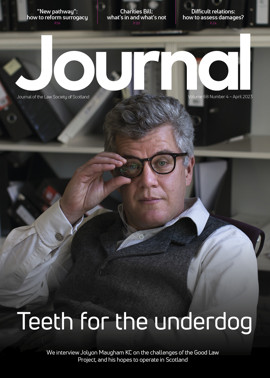In-house: Support to suit

Have you ever wished for an extra pair of hands at work, as the volume of work seemingly multiplies before your eyes? Or for specialist input for a period of time, without having to call up your external lawyers almost daily? Or perhaps you have worried about who will cover your team’s specialist while she is on maternity leave?
These are just some of the situations which can be addressed by the growing area of “flexible law services” or “legal outsourcing services”. In short, these are freelance legal providers who can step in and plug the gap in an in-house team’s repertoire. They offer consultants with different levels of experience, from paralegals, trainees, NQs, right through to FTSE100 general counsel and senior partner level.
Increasingly, such services are being used by in-house teams. There are also a growing number of lawyers who have transitioned into this new way of working, perhaps prompted by the post-Covid shift in working practices.
To find out more about how flexible law services could benefit the in-house community, I asked representatives of three such services – Roger Connon from Vario, Louisa Van Eeden-Smit from Obelisk Support, and James Lewindon from Konexo – to explain more.
What sort of work can your organisation assist an in-house legal team with?
RC: We cover all forms of commercial legal work. There are about 1,500 lawyers on the platform. We don’t do any private client work like domestic conveyancing, criminal work or wills and trusts.
JL: Essentially, anything that the legal team faces which has grown significantly in the last 10 years, from legal strategy, legal technology support, large scale projects, remediation, to resourcing the skills needed in-house – which could include paralegals, lawyers, project managers, compliance specialists, HR consultants and legal technologists.
LVES: Obelisk Support can provide in-house legal teams with ongoing or ad hoc flexible legal support, including cover for holiday, parental or long-term illness; access to a named pool of lawyers, when you need them; large or small ad hoc project support; major transactions support; and document automation.
What is the benefit of using a flexible legal service like yours, rather than contacting a traditional law firm?
RC: The benefits of using Vario – which is part of Pinsent Masons LLP – are cost, flexibility, and skillsets. Typically flex lawyers cover a maternity leave or a project, or a particular period of time when the client has a need.
JL: Konexo is wholly owned and part of Eversheds Sutherland (“ES”), which is a “traditional law firm”. Clients tell us the value they see in using Konexo is that we offer a variety of additional services. That combination is the main USP for Konexo. In relation to legal resourcing, a client knows that anyone we put forward has been stringently quality assured, has the support of a global law firm behind them when on placement, and has in-depth client knowledge from our existing relationship. Being global, clients know we can support them (and our consultants) with any challenge, regardless of where they are based.
LVES: Working with Obelisk helps clients deliver better results, manage their costs and be more productive. A key differentiator to contracting a traditional law firm is our speed and agility. Clients can access the spread of skills with us more affordably and flexibly; we are more solutions-oriented and can allow them to build a solution faster, unhindered by complex partnership decision-making. Our network comprises 2,000+ lawyers, covering 20+ sectors and 18 essential practice areas for corporate legal teams.
It is not unusual for in-house teams to seek secondees from law firms to plug gaps in their team. What is the appeal of using a flexible legal service instead?
RC: Good question. Many secondees might not have exactly the skillset required, and typically they will only be seconded by firms for certain periods of time, regardless of whether a maternity leave or project is completed.
JL: At Konexo we often supplement ES secondees to clients. As an example, in a number of instances we have some consultants sitting next to ES secondees at a client, while others sit next to ES employees at the law firm, all supporting the client on the same matter. We also provide consultants as an alternative to a secondee as we have a broad skills base in our talent pool that may match the client need more closely.
LVES: Our consultants bring a pragmatic, commercial approach from their experience in-house, alongside best practice from working with a variety of legal teams of different sizes and across different sectors. Leveraging flexible legal support, legal teams are not constrained by issues such as desk space or equipment. Plus, the service is easy to set up, helps them deliver on their goals for the business and is truly flexible. Costs are effectively managed, with a model of only pay for what you use. Lastly, legal teams can tap into a comprehensive network of lawyers and paralegals, whether to support on work overflow or as specialist support on a specific project.
What is the minimum/maximum length of time that your organisation can provide support for?
RC: We have all types of arrangements; some are ad hoc with no guaranteed minimum or maximum commitment. However, most tend to be a minimum of three months and the maximum in my experience would be about nine months – although often people prove so useful they are extended beyond this. These can be full time or only a certain number of days a week.
JL: We don’t put time limits on engagements. From very short term support (a few weeks) to ongoing ad hoc support (e.g. 10-20 hours a week) with no end date, to full time placements that have continued longer than four years, the flexibility of contract length is what clients and consultants enjoy.
LVES: There is no minimum or maximum commitment. Obelisk can provide support across small ad hoc projects, or act as an extension of your legal team for an indefinite period of time.
What process is involved in accessing your organisation’s services?
RC: We have a dedicated admin team who answer all queries and who agree work scopes, prepare bios for the client to review and if they are interested in any, set up the interviews.
JL: For a client wanting to access this support, we can quickly onboard them to work with us. We have consultants who can be working in as little as a few days depending on the client requirement.
LVES: Clients simply provide an outline of their requirements online, by calling their dedicated account manager, or by phone – whatever their preference.
How is a consultant matched to a brief? How can an in-house team be sure that the consultant will have the necessary skills and expertise without lots of support and training?
RC: We always agree the work scope in detail, provide CVs and bios, and the clients always interview the candidates before any offer is made.
JL: We have in-depth scoping sessions with clients to ensure we understand the requirements of the role. This is then assessed by our team, linking with a subject matter expert and client relationship lead within ES. We then use a mix of software tools, knowledge of our consultants, and cross team engagement to shortlist potential options before approaching a consultant. A key aspect is assessing a consultant’s ability to hit the ground running. However, we also know that ongoing support is key to a successful placement: we provide consultants with access to online learning tools (e.g. PLC), ES subject experts, briefings, training, and a dedicated consultant app to access support from their phone at any time.
LVES: We understand that relationship fit, and a solid cultural match, are as essential to our clients as speed and expertise. We use our proprietary matching technology and proven #HumanFirst methodology to ensure quality matches, fast. For larger projects and when using our virtual extended teams, clients can benefit from our project management services. Only lawyers and paralegals who have experience from both a top law firm and working in-house are eligible to join our community. Once vetted through a robust screening process, all our consultants and paralegals have access to support with our Talent team to ensure their skills remain competitive, with professional and personal development through tailored support and third party webinars.
Does the in-house team need to resource the consultant, for example, with a desk and laptop? What arrangements are in place in terms of professional liability cover, etc?
RC: Many work remotely but we can provide a computer. Often the client provides this, but it’s flexible and depends on whether the client needs the lawyer in their office or not. The flex lawyers get the benefit of our PI cover, hence we are very careful about who we invite onto the Vario bench.
JL: The working arrangements are very specific to the client and the project/resource need. Most clients issue a laptop/IT for a consultant to access their systems and work. Some have a fully remote working policy, and some projects need fully onsite office support. This is all scoped with the client before we send consultant profiles. All Konexo placements are covered by the insurance and policies ES has with all its clients.
LVES: Consultants can work 100% remotely, but clients can choose for consultants to be onboarded to their IT setup or use our secure Obelisk infrastructure. Obelisk also provides PI cover.
Are fees fixed up front? Is it an agreed total price or will the consultant charge on an hourly basis?
RC: Some arrangements are hourly, but mostly it is based on day rates which are agreed with the client up front.
JL: In general, consultants work on a day or hourly rate. This is decided with the client during the scoping phase. However, we have worked on both monthly and annual fee arrangements. We are completely flexible to client requirements.
LVES: We offer a range of pricing options. These include fixed fee arrangements on defined projects, access to consultants and paralegals charged out by the hour or day, or ongoing retainers for access to virtual extended teams so that legal teams are in full control of managing their legal spend.
Once the consultant has started, what does the relationship look like in practice?
RC: We keep in close contact with both the client and the flex lawyer to ensure the arrangement is working.
JL: In practice, Konexo consultants are there to support and be a part of the client legal team. They often become integral to that team. Further, they are part of the Konexo community, with regular socials with other consultants. Konexo consultants also become part of the ES client service team for that client.
LVES: Both our clients and consultants are supported pre-, during and post-engagement with regular check-ins to ensure proactive management of issues that may come up. They are also able to highlight opportunities to ensure legal teams save time and effort, can effectively manage their legal spend, and remain agile and proactive. Consultants benefit from personalised support during interview preparation, onboarding and throughout their placement.
If you are interested in finding out more about how flexible law services might help your in-house team, check out the testimonials on each organisation’s website, where various clients reflect on their experiences of using flexible law services.

Perspectives
Features
Briefings
- Criminal court: Towards proper control
- Planning: NPF4 – an emerging housing issue
- Insolvency: Court confirms overseas winding up approach
- Tax: R&D relief – welcome changes but outlook uncertain
- Immigration: Family reunions given new rules
- Scottish Solicitors' Discipline Tribunal
- In-house: Support to suit






